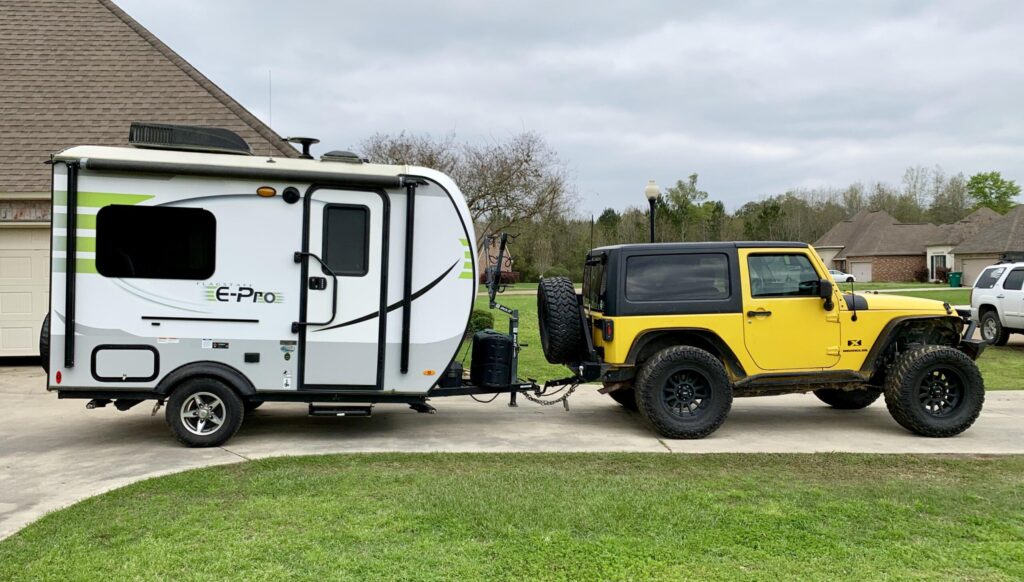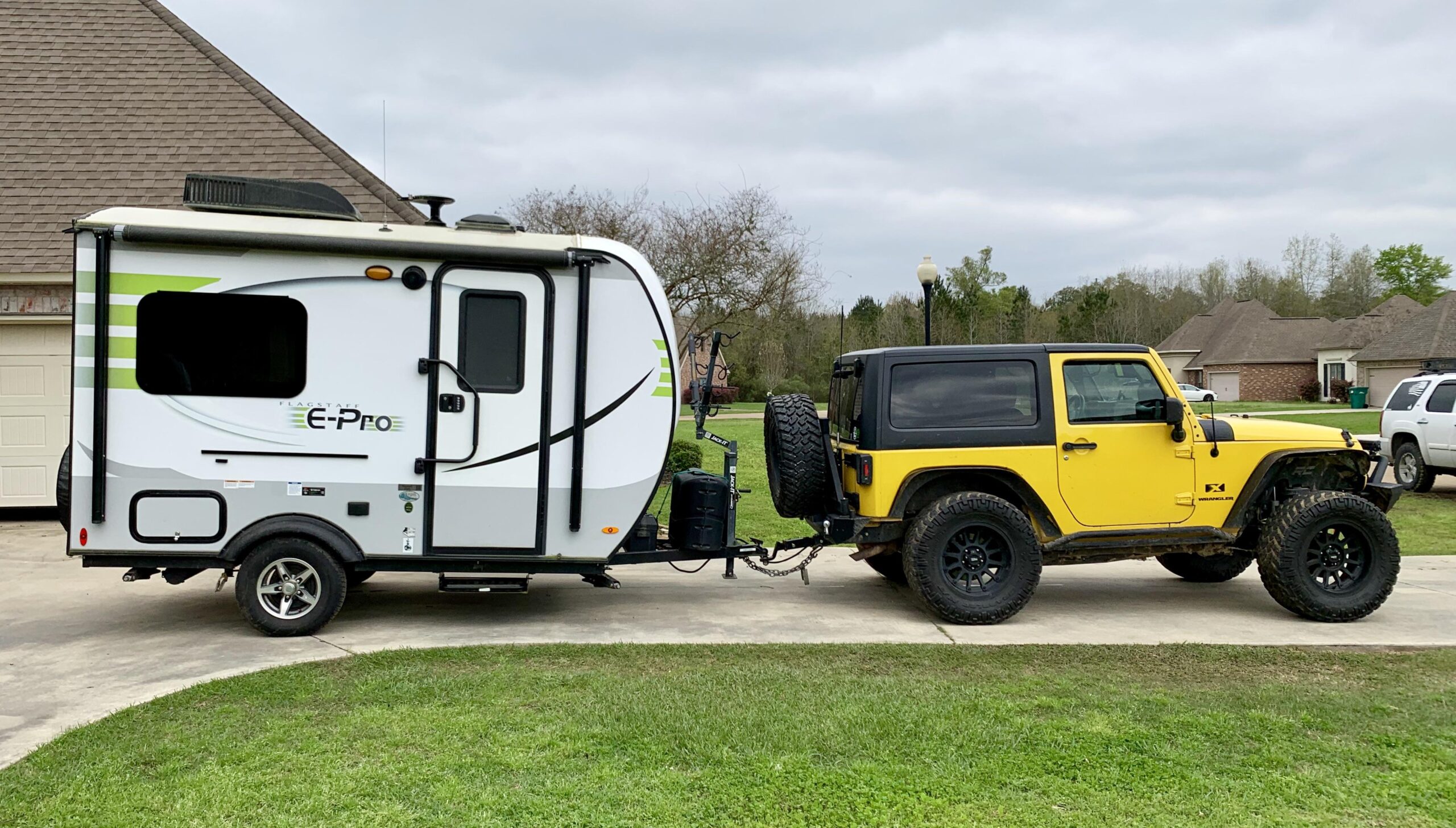
Can a Jeep Pull a Camper? Decoding Towing Capacity and Choosing the Right Rig
The allure of the open road, the crackle of a campfire, and the freedom of exploring the wilderness – these are the promises of camper life. For many, the Jeep brand represents adventure and off-road capability, sparking the question: Can a Jeep pull a camper? The answer, as with most things in the automotive world, is nuanced. It depends on the specific Jeep model, the camper’s weight, and the intended use.
This article dives deep into the world of Jeep towing, providing a comprehensive guide to help you determine if your Jeep is up to the task of pulling a camper. We’ll explore the factors that influence towing capacity, the different Jeep models and their capabilities, and the essential considerations for safe and enjoyable camping adventures. Understanding the intricacies of towing is crucial for both safety and peace of mind. This guide will empower you to make informed decisions, ensuring your Jeep and camper journey is a success.
Understanding Towing Capacity: The Foundation of Safe Camping
Before even considering a specific Jeep model, it’s vital to grasp the concept of towing capacity. This is the maximum weight a vehicle is designed to safely pull, including the trailer and its contents. Exceeding this limit can lead to serious consequences, including:
- Reduced Braking Performance: Overloading a vehicle significantly increases stopping distances, posing a major safety hazard.
- Transmission Damage: The transmission can overheat and fail when subjected to excessive strain.
- Engine Strain: An overloaded engine works harder, potentially leading to premature wear and tear.
- Suspension Issues: The suspension system may struggle to handle the added weight, leading to instability and damage.
- Legal Ramifications: Exceeding the towing capacity can violate local laws and invalidate insurance coverage in the event of an accident.
Towing capacity is determined by several factors, including the vehicle’s engine, transmission, brakes, suspension, and chassis design. Manufacturers conduct rigorous testing to establish these limits, ensuring the vehicle’s structural integrity and the safety of its occupants. Always consult your Jeep’s owner’s manual and the manufacturer’s specifications for the exact towing capacity of your specific model. This is the most reliable source of information.
Jeep Model Towing Capacities: A Comparative Overview
Jeep offers a diverse lineup of vehicles, each with varying towing capabilities. Here’s a breakdown of common Jeep models and their general towing capacities. Remember that these are approximate figures and can vary depending on the specific year, trim level, and optional equipment. Always verify the information with your vehicle’s documentation.
Jeep Wrangler
The iconic Wrangler is synonymous with off-road adventures, but its towing capacity varies significantly depending on the model and configuration. Generally, newer Wrangler models (2018+) with the V6 engine can tow up to 3,500 pounds. The four-cylinder turbo engine often has a slightly lower capacity. Older models may have different towing limits, so always check your specific vehicle’s specifications. A Jeep Wrangler can certainly pull a camper, but the size and weight of the camper must be carefully considered.
Jeep Gladiator
The Gladiator, a pickup truck based on the Wrangler, boasts a significantly higher towing capacity. Depending on the engine and equipment, the Gladiator can tow up to 7,650 pounds. This makes it a more suitable choice for pulling larger campers. This is a key differentiator when considering if a Jeep can pull a camper. The Gladiator’s enhanced towing capabilities are a major selling point for those who desire both off-road prowess and the ability to haul a camper.
Jeep Grand Cherokee
The Grand Cherokee offers a blend of on-road comfort and off-road capability. The towing capacity varies depending on the engine and trim level, but typically ranges from 6,200 to 7,200 pounds. The Grand Cherokee is a versatile option for those seeking a balance between daily driving and weekend camping adventures. With the right configuration, a Jeep Grand Cherokee can be a capable tow vehicle for many camper sizes. However, always check the specific towing capacity of your Grand Cherokee before making any decisions.
Jeep Cherokee
The Cherokee, a smaller SUV, has a lower towing capacity compared to the Grand Cherokee and Gladiator. Depending on the engine and options, it can typically tow between 2,000 and 4,500 pounds. While suitable for smaller campers or trailers, it’s crucial to stay within the manufacturer’s limits. The question of can a Jeep pull a camper becomes more nuanced with the Cherokee, necessitating careful consideration of the camper’s weight.
Jeep Compass and Renegade
The Compass and Renegade are the smallest SUVs in the Jeep lineup. Their towing capacities are generally lower, typically ranging from 1,000 to 2,000 pounds. These models are generally best suited for smaller trailers or utility purposes rather than larger campers. The answer to “can a Jeep pull a camper?” is often no with these models, unless it’s a very small, lightweight camper.
Matching Your Camper to Your Jeep: Key Considerations
Determining whether your Jeep can safely pull a camper involves more than just knowing the towing capacity. Several other factors play a crucial role in ensuring a safe and enjoyable camping experience.
Camper Weight
The most important factor is the weight of the camper. This includes the camper’s dry weight (the weight without any cargo or fluids), as well as the weight of any gear, water, propane, and other items you plan to carry. Always stay well below your Jeep’s maximum towing capacity to allow for a safety margin. Exceeding the limit can be dangerous.
Camper Size and Shape
The size and shape of the camper also affect towing performance. A larger, taller camper will create more wind resistance, potentially impacting fuel economy and handling. Consider the overall length and width of the camper and how it will affect maneuverability, especially in tight spaces or on winding roads. Smaller, more aerodynamic campers are generally easier to tow.
Weight Distribution and Tongue Weight
Proper weight distribution is crucial for safe towing. The tongue weight (the downward force exerted by the trailer on the hitch) should typically be between 10% and 15% of the total trailer weight. Incorrect weight distribution can lead to instability and sway. Consider using a weight distribution hitch, especially for heavier campers.
Braking System
Ensure your camper has a functioning braking system. Many larger campers are equipped with electric brakes that are controlled by a brake controller in the tow vehicle. Verify that your Jeep is compatible with the camper’s braking system and that the brake controller is properly installed and calibrated. A properly functioning braking system is essential for safe stopping distances.
Driving Experience and Terrain
Consider your driving experience and the terrain you’ll be traversing. Towing a camper requires a different driving style than driving a vehicle without a trailer. Be prepared for longer stopping distances, reduced acceleration, and increased sensitivity to wind. Off-road driving with a camper can be challenging, requiring careful planning and execution. Ensure your Jeep is equipped for the intended terrain and that you are comfortable with the driving conditions.
Essential Equipment for Jeep Camper Towing
Proper equipment is essential for safe and legal towing. Here’s a list of essential items:
- Tow Hitch: Ensure your Jeep is equipped with a properly rated tow hitch that is compatible with your camper.
- Wiring Harness: A wiring harness is needed to connect the camper’s lights and brakes to your Jeep.
- Brake Controller (if applicable): If your camper has electric brakes, you’ll need a brake controller in your Jeep.
- Weight Distribution Hitch (for heavier campers): This helps distribute the weight of the trailer more evenly, improving stability.
- Mirrors: Extended side mirrors are often necessary to provide adequate visibility around the camper.
- Safety Chains: Safety chains are crucial in case the hitch fails.
- Trailer Sway Control (optional): This system helps to mitigate trailer sway, enhancing safety.
Can a Jeep Pull a Camper? The Verdict
The question of whether a Jeep can pull a camper is not a simple yes or no. The answer depends on the specific Jeep model, the camper’s weight, and the equipment used. Some Jeeps, like the Gladiator, are specifically designed for towing, while others, like the Compass, are better suited for smaller trailers. Carefully assess your Jeep’s towing capacity, the camper’s weight, and all relevant factors before attempting to tow a camper. Prioritize safety and always stay within the manufacturer’s guidelines. With the right setup and precautions, a Jeep can provide a fantastic platform for exploring the great outdoors with a camper.
The ability to tow a camper opens up a world of possibilities for Jeep owners. Whether you are planning a weekend getaway or a cross-country adventure, a Jeep and a camper can provide the freedom and flexibility to explore the world on your terms. Just remember to do your research, choose the right equipment, and prioritize safety. Can a Jeep pull a camper? Yes, it can, but only if you do it right.
[See also: Camper Trailer Buying Guide, Jeep Maintenance Tips for Towing, Off-Road Camping Essentials]


